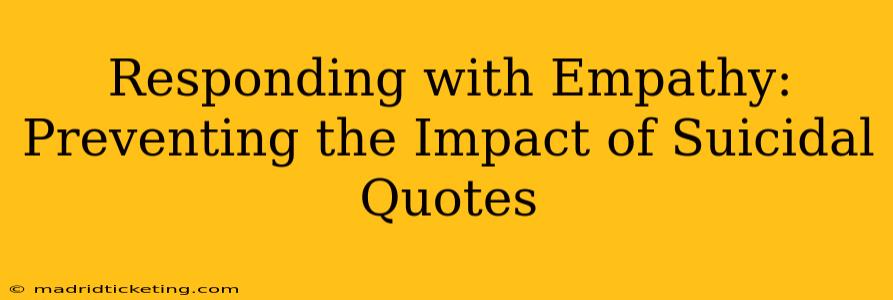The internet, a boundless source of information and connection, unfortunately also harbors dark corners. One such area is the proliferation of suicidal quotes, often shared unknowingly or with harmful intent. These quotes, whether intentionally or unintentionally, can have a devastating impact on vulnerable individuals, potentially triggering suicidal ideation or worsening existing mental health struggles. This article delves into the dangers of such quotes, explores effective strategies for responding empathetically, and outlines preventative measures to minimize their harmful effects.
Why are Suicidal Quotes So Dangerous?
Suicidal quotes, even seemingly innocuous ones, can normalize suicidal thoughts and behaviors, especially for those already struggling. They can:
- Validate negative feelings: For someone experiencing despair, a quote expressing similar feelings might offer a sense of validation, reinforcing their negative self-perception.
- Suggest solutions: Some quotes might subtly or explicitly suggest suicide as a solution to overwhelming problems, providing a dangerous path seemingly validated by others.
- Trigger ideation: Exposure to suicidal content can trigger or worsen suicidal ideation in vulnerable individuals. The mere presence of such material can plant seeds of despair.
- Reduce help-seeking: The normalization of suicidal thoughts can decrease the likelihood of someone seeking help, making it harder to break the cycle of despair.
How to Respond Empathetically to Suicidal Quotes
Encountering a suicidal quote online requires a delicate and compassionate response. Avoid judgment or dismissal; instead, focus on empathy and support. Here's how:
- Acknowledge the pain: Start by acknowledging the underlying pain and distress expressed in the quote. Phrases like "This speaks to real suffering" or "It's clear there's immense pain here" can show understanding.
- Offer support: Provide resources and support for individuals struggling with suicidal thoughts. This might include mentioning the National Suicide Prevention Lifeline (988 in the US) or Crisis Text Line (text HOME to 741741). Provide links to relevant organizations offering mental health support in your country.
- Challenge the narrative: Gently challenge the destructive narrative presented in the quote. This should be done with sensitivity, avoiding any language that could further minimize or invalidate their experience. You might say something like, "While this quote expresses pain, it's important to remember that help is available, and things can get better."
- Report harmful content: If the quote is posted on a platform with reporting mechanisms, report it. This helps remove harmful content from public view.
- Promote positive messages: Counter the negativity by sharing messages of hope, resilience, and help-seeking. Highlight the importance of mental health and the availability of resources.
What if I’m unsure if a quote is truly suicidal?
When in doubt, err on the side of caution. If a quote expresses extreme despair, hopelessness, or self-harm, treat it as potentially harmful and respond with empathy and support as detailed above. It's better to be overly cautious than risk unintentionally contributing to someone's distress.
How can I prevent the spread of suicidal quotes?
Prevention is key. Here are some steps to minimize the spread of harmful content:
- Don't share it: Avoid sharing quotes that express suicidal thoughts, even if you don't intend to cause harm. The unintended consequences can be severe.
- Report harmful content: Use reporting mechanisms on social media and other online platforms to report content that promotes self-harm or suicide.
- Promote mental health awareness: Advocate for mental health awareness and the destigmatization of mental illness.
- Educate others: Share information about suicide prevention and mental health resources with your friends, family, and community.
Where can I find more information about suicide prevention?
Numerous organizations worldwide offer vital resources and support for individuals struggling with suicidal thoughts and their loved ones. Search online for suicide prevention resources specific to your country or region. Many offer helplines, online chat support, and educational materials.
By understanding the potential harm of suicidal quotes and implementing empathetic responses and preventative measures, we can contribute to a safer and more supportive online environment. Remember, your actions can make a difference. Your empathy and proactive approach can help save a life.

